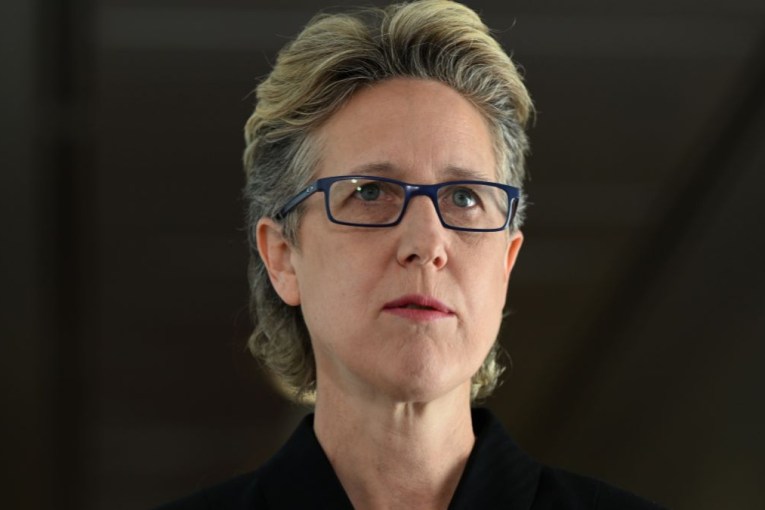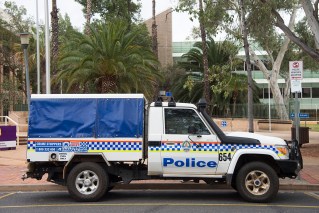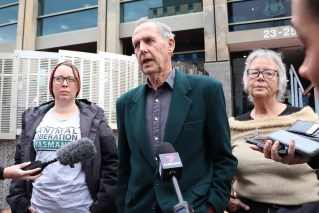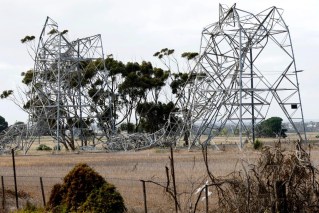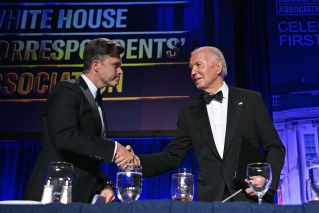How to counter Australia’s growing neo-Nazi threat

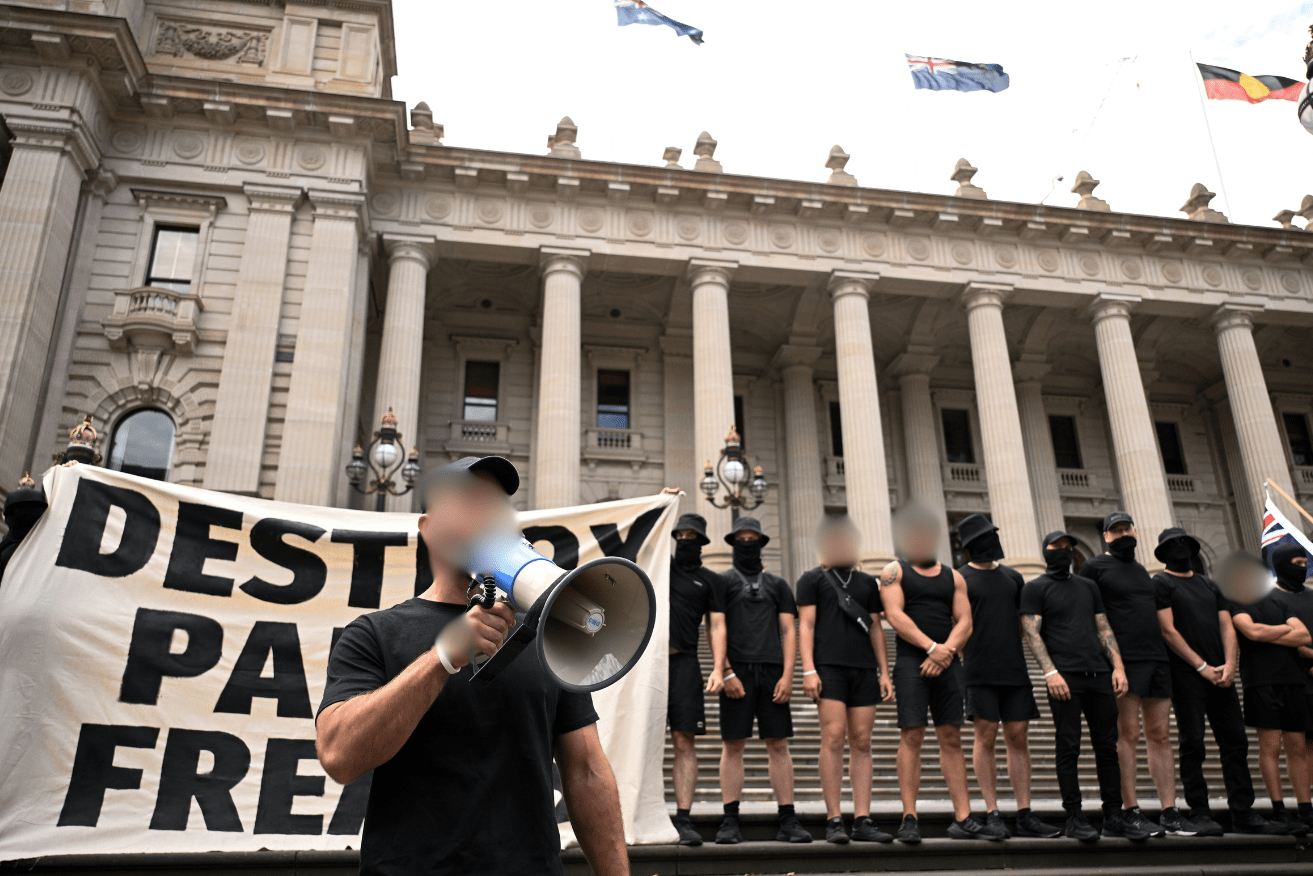
Neo-Nazis have been gathering in public around Australia. Photo: AAP
Far-right extremists, including white supremacists and neo-Nazis, are getting louder and more confident in spreading their messages of hate around Australia.
Much of the blame can be pinned on international influences and lack of consequences here at home, experts told The New Daily.
Australian white supremacists and neo-Nazis are encouraging members to undergo combat sports training and law enforcement avoidance under the banner of “Active Clubs”, a parliamentary inquiry into right-wing extremism heard from the Counter Extremism Project (CEP).
The CEP called for close monitoring of this activity.
“There is increasing evidence suggesting that the network’s main objective is instead the creation of shadow militias that can be activated when the need for co-ordinated violent action on a larger scale arises,” CEP said.
A submission from Australia’s national security agency ASIO revealed ideologically motivated extremism, particularly nationalist and racist violent extremism, accounts for 25 per cent of the organisation’s priority counter-terrorism caseload.
The agency said the 2019 Christchurch attack was being used as inspiration by right-wing extremists.
In February, ASIO director-general of security Mike Burgess said there had been an uptick in “the number of nationalist and racist violent extremists advocating sabotage in private conversations”.
This was particularly pronounced amongst extremists who wanted to trigger a ‘race war’, and they endorsed attacks on power networks, electrical substations and railway networks.
“The threat from nationalist and racist violent extremism persists,” Burgess said.
Rise of right-wing extremism
There has been a steady rise of right-wing extremists shouting their messages on social media and the streets in Australia in the past decade.
Neo-Nazi rallies have been held in Melbourne and Sydney. Deakin University terrorism and violent extremism expert Greg Barton said the escalation in public activities were attempts to grow the number of neo-Nazi members and build their brand.
“Making a Hitler salute in a public place, [displaying] provocative banners, joining rallies – they see these as good ways to get media attention, and therefore … free marketing,” he said.
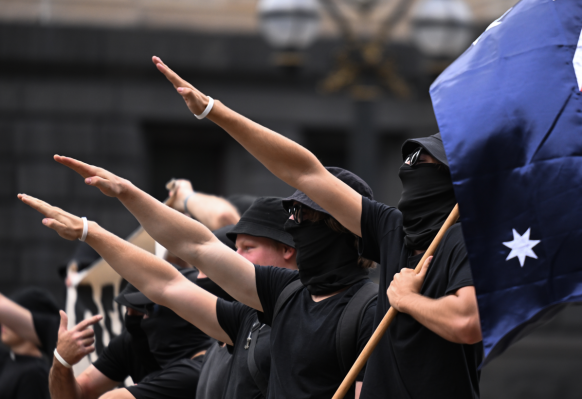
The Nazi salute is now banned. Photo: AAP
The rise of populist right-wing leaders such as Donald Trump over the past decade provided fertile ground for the growth of right-wing extremists overseas, who in turn have spread their views to Australia.
Australia also has its own unresolved history of slavery, systemic racism and violence which has left behind a “permissive environment” for current neo-Nazi actions, Barton said.
“They’re finding that they can get away with outrageous behaviour and not face legal reprisals … that are completely immobilising,” he said.
Neo-Nazis take advantage of other people with far-right ideals, such as conspiracy theorists and anti-LGBTQI+ activists to make their numbers seem greater than they are.
“We don’t actually have tens of thousands of neo-Nazis,” Barton said.
“We have tens of thousands of people who are drawn to far-right and other ideas, and a smaller number who actually step out and engage as neo-Nazis.”
In its submission to the parliamentary inquiry, the Department of Home Affairs said young people are particularly susceptible to radicalisation by online violent extremist propaganda which resonated with their feelings of “alienation, unease about the future, and mistrust of authority”.
The department said violent extremists were also exploiting online
gaming platforms to radicalise and recruit an increasingly younger cohort of internet users.
What’s the risk of violence?
The Department of Home Affairs stated “radically
anti-democratic” right-wing extremists have directly targeted and threatened institutions such as Victorian councils over their support of the LGBTQIA+ community.
In its inquiry submission, ASIO said the vast majority of established nationalist and racist groups were more focused on recruitment and radicalisation rather than attack planning for the foreseeable future.
But if an attack were to happen, ASIO expects it will be low-cost, using readily-available weapons such as knives or vehicles.
The most likely location for a terrorist attack in Australia is a crowded place in a major city, such as shopping centres or transport hubs. Government buildings or places of worship could also be possible targets.
But physical violence isn’t the only form of violence, Deakin University associate professor of politics Josh Roose said.
“[Neo-Nazis] are violent every single day online in spreading hatred and animosity towards Jewish people [and] other communities as well,” he said.
He said the biggest targets of their hate campaigns include Jews, migrants, LGBTQIA+ people and women.
In terms of physical violence, the general consensus is a lone actor, rather than a group, presents the most risk.
Barton said the individual would not only hold far-right extremist views, but would also likely be shaped by elements such as a personality disorder.
“They want the attention. They don’t want to die as martyrs, they want to survive the attack, and then be praised,” he said.
What can be done?
In January, the government banned public Nazi salutes and made it unlawful to publicly display or trade in Nazi hate symbols.
More laws are unlikely to stamp out neo-Nazis, but banning things like the Nazi salute could give the police the opportunity to take more action, Barton said.
He said there also needs to be a reflection on the national discourse of hot-button issues so Australia isn’t poisoned by American-style hate campaigns on everything from abortions to sexual identity.
As many far-right extremists hide behind masks in person and pseudonyms, Roose called for more efforts to identify them.
“Hold them accountable for what they’re writing in Australia, about Australia,” he said.
“It’s important to be constantly vigilant.
“When they say that they are seeking to achieve an aim … it’s not enough to laugh at them or say that could never happen in our country, because historically it has happened.”
